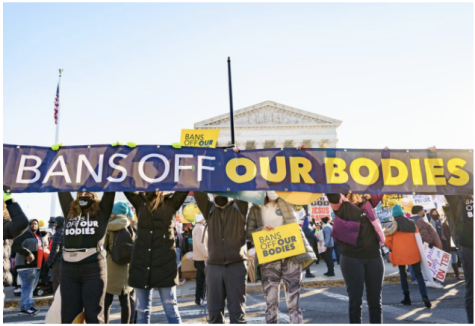Roe v. Wade 49 Years Later
January 28, 2022
January 22nd, 1973 was a monumental day in the history of the United States. It was the day of the court case Roe v. Wade, and this weekend was its 49th anniversary, a nearly 50-year milestone for a case that is now in danger of being reversed altogether.
The court case supported women’s rights to a legal abortion, which was supported by the Constitution of the United States. And not only did the case allow for legal abortions, but it allowed for the right of women’s access to healthcare in order to prevent unnecessary deaths due to illegal abortions. Not allowing a woman to get an abortion was said to be an infringement of the first, fourth, fifth, ninth, and fourteenth amendments. This case was between plaintiff Jane Roe and defendant Henry Wade. Jane Roe was a fictional name given to the individual to maintain the privacy of her identity, while Henry Wade was the district attorney of Dallas, Texas. Roe filed a lawsuit to challenge a law in Texas which stated that abortions were illegal unless they were necessary to save the woman’s life.

Roe explained that this law was unconstitutional and violated several amendments. Roe won the case with a vote of 7-2. This case regulated the time in which a woman had to terminate their pregnancy to the end of the first trimester before the fetus had the “capability of meaningful life outside the mother’s womb.”
Since the recent Mississippi court case, Dobbs v. Jackson Women’s Health Organization, the Roe v. Wade case has been under attack. Jackson Women’s Health Organization is currently the only licensed abortion facility in Mississippi. One of the doctors from organization filed a lawsuit challenging Mississippi law and requested a temporary restraining order. In the meantime, an investigation occurred to determine a fetus’ viability at 15 weeks old. According to the Supreme Court, states cannot ban abortions before viability. If this law is changed in Mississippi, then it will affect the abortion laws in all of the United States and ultimately overturn Roe v. Wade. The decision is still pending and is expected by the end of June. So, what happens if it is overturned? Many states will have the power to determine the future of all women by determining whether they can legally get an abortion or not. Other states have policies in place that will prevent this from happening regardless of the case ruling. The states that will be most affected by the overturning of Roe v. Wade would be southern and midwestern states because of their current policies in place. There is a high likelihood of Roe v. Wade being overturned based on the makeup of the Supreme Court. Three of the nine Supreme Court justices have already ruled against legal abortions, and the three newest Supreme Court Justices have a history of being against reproductive rights. Of the nine Supreme Court Justices, six of them will most likely vote to overturn the case––majority rules.

















































































































































